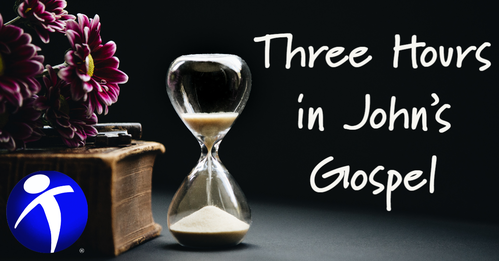Three Hours in John's Gospel

While all of the Gospel accounts call attention to the specific hour of the day certain things happened during Jesus’ crucifixion (Matthew 27:45-46; Mark 15:25, 33-34; Luke 23:44; John 19:14), the only account to use time in reference to other events is John’s. On three occasions in his account of the life of Jesus, John references the time of day something occurred. Let’s reflect upon these three hours and the powerful reminders they give.
As John 4 opens up, Jesus perceives that the Pharisees had taken note of His growing following, determines to leave their primary sphere of influence, Judea, and returns to Galilee (John 4:1-3). This demanded that He pass through Samaria (John 4:4). The text records Jesus pausing at a well near the city of Sychar and describes Him as “being wearied from His journey” (John 4:6). Perhaps to highlight why He might be wearied, John adds here, “It was about the sixth hour,” which, converting Jewish time to ours, would be roughly 12:00PM, high noon. This hour reminds us of the humanity of Jesus; He can “sympathize with our weaknesses,” even something as simple as being tired on a hot day (Hebrews 4:15).
At the close of John 4, Jesus is once again in Galilee. He is sought out by “a certain nobleman whose son was sick at Capernaum” (John 4:46). Desiring his son’s healing, this nobleman “went to [Jesus] and implored Him to come down and heal” him (John 4:47). Jesus first tests the nobleman’s resolve and then his faith; will He believe if Jesus merely pronounces the boy healed (John 4:48-50)? He does and discovers upon returning home that the boy had recovered “at the seventh hour,” which was “at the same hour” Jesus had pronounced the boy well (John 4:51-53). This hour reminds us of the Deity of Jesus; He is not limited by time, space, or any difficulty that we might face.
Earlier in John’s Gospel, we see Jesus beginning to develop a following. Recorded are how Andrew, Peter, Philip, and Nathaniel became acquainted with Jesus (John 1:35-51). Evidently this is prior to when Peter and Andrew “left all” to follow him at the Sea of Galilee as the events of this day differ (cf. Matthew 4:18-22; 19:27; Mark 1:16-20; 10:28; Luke 5:1-11; 18:28). Still, for Andrew and an unnamed disciple, this was an incredibly impactful day, as it was when they left John the Immerser (not to be confused with John the apostle and Gospel writer) and began their journey with Jesus. I’ve often wondered, is the unnamed companion of Andrew none other than John himself, keeping his identity hidden as he does throughout the account (e.g., John 13:23-25)? Whether it is or is not, “the tenth hour” was for those two men the unforgettable moment when they answered Jesus’ call to “Come and see” (John 1:39).
Does the tenth hour remind you of anything? I hope it reminds you of the day you began to investigate Jesus with open eyes. Those who do so discover both a man who understands them and a God who can save them.
As John 4 opens up, Jesus perceives that the Pharisees had taken note of His growing following, determines to leave their primary sphere of influence, Judea, and returns to Galilee (John 4:1-3). This demanded that He pass through Samaria (John 4:4). The text records Jesus pausing at a well near the city of Sychar and describes Him as “being wearied from His journey” (John 4:6). Perhaps to highlight why He might be wearied, John adds here, “It was about the sixth hour,” which, converting Jewish time to ours, would be roughly 12:00PM, high noon. This hour reminds us of the humanity of Jesus; He can “sympathize with our weaknesses,” even something as simple as being tired on a hot day (Hebrews 4:15).
At the close of John 4, Jesus is once again in Galilee. He is sought out by “a certain nobleman whose son was sick at Capernaum” (John 4:46). Desiring his son’s healing, this nobleman “went to [Jesus] and implored Him to come down and heal” him (John 4:47). Jesus first tests the nobleman’s resolve and then his faith; will He believe if Jesus merely pronounces the boy healed (John 4:48-50)? He does and discovers upon returning home that the boy had recovered “at the seventh hour,” which was “at the same hour” Jesus had pronounced the boy well (John 4:51-53). This hour reminds us of the Deity of Jesus; He is not limited by time, space, or any difficulty that we might face.
Earlier in John’s Gospel, we see Jesus beginning to develop a following. Recorded are how Andrew, Peter, Philip, and Nathaniel became acquainted with Jesus (John 1:35-51). Evidently this is prior to when Peter and Andrew “left all” to follow him at the Sea of Galilee as the events of this day differ (cf. Matthew 4:18-22; 19:27; Mark 1:16-20; 10:28; Luke 5:1-11; 18:28). Still, for Andrew and an unnamed disciple, this was an incredibly impactful day, as it was when they left John the Immerser (not to be confused with John the apostle and Gospel writer) and began their journey with Jesus. I’ve often wondered, is the unnamed companion of Andrew none other than John himself, keeping his identity hidden as he does throughout the account (e.g., John 13:23-25)? Whether it is or is not, “the tenth hour” was for those two men the unforgettable moment when they answered Jesus’ call to “Come and see” (John 1:39).
Does the tenth hour remind you of anything? I hope it reminds you of the day you began to investigate Jesus with open eyes. Those who do so discover both a man who understands them and a God who can save them.
Recent
Archive
2026
2025
January
March
April
May
June
July
September
October
November
2024
January
February
March
May
July
August
September
October
November
2023
January
